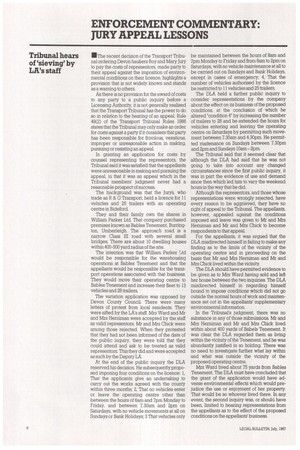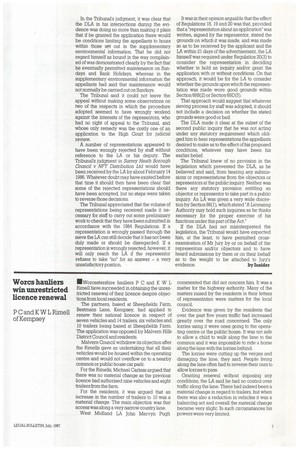Tribunal hears of 'sieving' by LA's staff
Page 96

Page 97

If you've noticed an error in this article please click here to report it so we can fix it.
• The recent decision of the Transport Tribunal ordering Devon hauliers Roy and Mary Jury to pay the costs of representors, made party to their appeal against the imposition of environmental conditions on their licence, highlights a provision that is not widely known and stands as a warning to others.
As there is no provision for the award of costs to any party to a public inquiry before a Licensing Authority, it is not generally realised that the Transport Tribunal has the power to do so in relation to the hearing of an appeal. Rule 49(2) of the Transport Tribunal Rules 1986 states that the Tribunal may only make an order for costs against a party if it considers that party has been responsible for frivolous, vexatious, improper or unreasonable action in making, pursuing or resisting an appeal.
In granting an application for costs by counsel representing the representors, the Tribunal said it was satisfied that the appellants were unreasonable in making and pursuing the appeal, in that it was an appeal which in the Tribunal members judgment never had a reasonable prospect of success.
The background was that the Jurys, who trade as R & G Transport, held a licence for 11 vehicles and 25 trailers with an operating centre in Bideford.
They and their family own the shares in William Parker Ltd. That company purchased premises known as Babies Tenement, Burrington, Umberleigh. The approach road is a narrow Class III road with several small bridges. There are about 10 dwelling houses within 400-500 yard radius of the site.
The intention was that William Parker Ltd would be responsible for the warehousing operations at Babies Tenement and that the appellants would be responsible for the transport operations associated with that business, They would move their operating centre to Babies Tenement and increase their fleet to 13 vehicles and 28 trailers.
The variation application was opposed by Devon County Council. There were many letters of protest from local residents. They were sifted by the LA's staff. Mrs Ward and Mr and Mrs Hemirnan were accepted by the staff as valid representors. Mr and Mrs Chick were among those rejected. When they protested that they had not been informed of the date of the public inquiry, they were told that they could attend and ask to be treated as valid representors. This they did and were accepted as such by the Deputy LA.
At the end of the public inquiry the DLA reserved his decision. He subsequently proposed imposing four conditions on the licence: 1, That the applicants give an undertaking to carry out the works agreed with the county within three months; 2, That no vehicles enter or leave the operating centre other than between the hours of 6am and 7pm Monday to Friday, and between 7.30am and 2pm on Saturdays, with no vehicle movements at all on Sundays or Bank Holidays; 3 That vehicles only be maintained between the hours of 8ann and 7pm Monday to Friday and from Barn to 2pm on Saturdays, with no vehicle maintenance at all to be carried out on Sundays and Bank Holidays, except in cases of emergency; 4, That the number of vehicles authorised by the licence be restricted to 11 vehicles and 25 trailers.
The DLA held a further public inquiry to consider representations by the company about the effect on its business of the proposed conditions, at the conclusion of which he altered "condition 4" by increasing the number of trailers to 28 and he extended the hours for vehicles entering and leaving the operating centre on Saturdays by permitting such movement between 7.30am and 4.30pm. He permitted maitenance on Sundays between 7.30pm and 2pm and Sundays 10am 2pm.
The Tribunal said that it seemed clear that although the DLA had said that he was not going to take into account any changed circumstances since the first public inquiry, it was in part the evidence of use and demand since then which led him to vary the weekend hours in the way that he did.
Although the representors, and those whose representations were wrongly rejected, have every reason to be aggrieved, they have no right of appeal to the Tribunal. The appellants, however, appealed against the conditions imposed and leave was given to Mr and Mrs Herniman and Mr and Mrs Chick to become respondents to that appeal.
For the appellants, it was argued that the DLA misdirected himself in failing to make any finding as to the limits of the vicinity of the operating centre and in proceeding on the basis that Mr and Mrs Hemiman and Mr and Mrs Chick lived within the vicinity.
The DLA should have permitted evidence to be given as to Mrs Ward having sold and left her house between the two inquiries. The DLA misdirected himself in regarding himself bound to impose conditions which did not go outside the normal hours of work and maintenance set out in the appellants' supplementary environmental information.
In the Tribunal's judgment, there was no substance in any of those submissions. Mr and Mrs Hernirnan and Mr and Mrs Chick lived within about 400 yards of Babels Tenement It was clear the DLA regarded them as living within the vicinity of the Tenement, and he was abundantly justified in so holding. There was no need to investigate further what lay within and what was outside the vicinity of the proposed operating centre.
Mrs Ward lived about 75 yards from Babies Tenement The DLA must have concluded that the grant of the application would have adverse environmental effects which would prejudice the use or enjoyment of her property. That would be so whoever lived there. In any event, the second inquiry was, or should have been, limited to hearing representations from the appellants as to the effect of the proposed conditions on the appellants' business. In the Tribunal's judgment, it was clear that the DLA in his interjections during the evidence was doing no more than making it plain that if he granted the application there would be conditions limiting the appellants to hours within those set out in the supplementary environmental information. That he did not regard himself as bound in the way complained of was demonstrated clearly by the fact that he eventually permitted maintenance on Sundays and Bank Holidays, whereas in the supplementary environmental information the appellants had said that maintenance would not normally be carried out on Sundays.
The Tribunal said it could not leave the appeal without making some observations on two of the respects in which the procedure adopted seemed to have wrongly worked against the interests of the representors, who had no right of appeal to the Tribunal, and whose only remedy was the costly one of an application to the High Court for judicial review.
A number of representations appeared to have been wrongly rejected by staff without reference to the LA or his deputy, The Tribunal's judgment in Surrey Heath Borough Council v NFT Distribution Ltd would have been received by the LA by about February 14 1986. Whatever doubt may have existed before that time it should then have been clear that some of the rejected representations should have been accepted, but no steps were taken to reverse those decisions.
The Tribunal appreciated that the volume of representations being received made it necessary for staff to carry out some preliminary work to check that they have been submitted in accordance with the 1984 Regulations. If a representation is wrongly passed through the sieve the LA can still decide that it has not been duly made or should be disregarded, If a representation is wrongly rejected, however, it will only reach the LA if the representor refuses to take 'no' for an answer — a very unsatisfactory position, It was in their opinion arguable that the effect of Regulations 18, 19 and 20 was that, provided that a "representation about an application" was written, signed by the representor, stated the grounds on which it was made, and was made so as to be received by the applicant and the LA within 21 days of the advertisement, the LA himself was required under Regulation 20(3) to consider the representation in deciding whether to hold an inquiry and/or grant the application with or without conditions. On that approach, it would be for the LA to consider whether the grounds upon which the representation was made were good grounds within Section 6913(2) or Section 69D(5).
That approach would suggest that whatever sieving process by staff was adopted, it should not include a decision on whether the stated grounds were good or bad.
The DLA made it clear at the outset of the second public inquiry that he was not acting under any statutory requirement which obliged him to hear representations the appellants desired to make as to the effect of his proposed conditions, whatever may have been his earlier belief.
The Tribunal knew of no provision in the legislation which prevented the DLA, as he believed and said, from hearing any submissions or representations from the objectors or representors at the public inquiry. Neither was there any statutory provision entitling an objector or representor to take part in a public inquiry. An LA was given a very wide discretion by Section 86(1), which stated "A Licensing Authority may hold such inquiries as he thinks necessary for the proper exercise of his functions under this part of the Act."
If the DLA had not misinterpreted the legislation, the Tribunal would have expected him, at the least, to have permitted crossexamination of Mr Jury by or on behalf of the representors and/or objectors and to have heard submissions by them or on their behalf as to the weight to be attached to Jury's evidence. by Insides




































































































